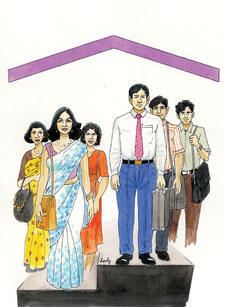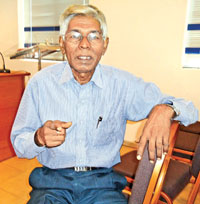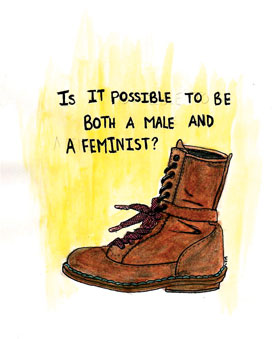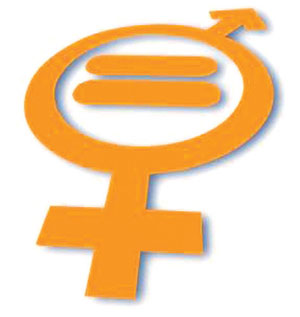 |
Gender Forum
offers you an opportunity to share your views
and concerns with us. Email to
[email protected]
or mail to Gender Forum, C/O Features Editor, Daily News-
Editorial, Lake House, Colombo. |
Women and the workplace
Ishara JAYAWARDANE
Women have come a long way and in Sri Lanka unlike most other
countries women have greater freedom than in the past. They have
excelled in almost every field that involves men and in some cases
superseded men. Yet there is discrimination to a certain extent against
women in the workplace.

 |
|
Professor
B.A. Tennyson Perera |
According to Professor B.A. Tennyson Perera of the Department of
Sociology, University of Sri Jayawardenepura there are two reasons for
discrimination. “ One is a historical reason. Sri Lankan society is a
traditional agricultural society first of all. Our society can be called
a patrilineal society. Father is the dominant figure in the family.
Therefore the advantage is with the male section more than the female
section. As a result our society always elevates the status of the man
rather than the women. Even though Buddhism played a great role in
enhancing the life of women, still, the point is man is dominant rather
than woman.”
Since our society is a patrilineal society all the decisions are made
by the father. He is the prime person dealing with all kinds of issues
within the family. He plays the dominant role. Therefore males think
that women should devote their life to the kitchen, and also bearing and
rearing children.
The Second reason for discrimination is a biological one. Perera
pointed out that when a female is pregnant she is limited to the house.
She has to spend a number of months at home limited to the house. She
can’t do her normal work that she did before she was pregnant. She is
devoted to her child and has to spend a number of months at home. These
biological differences contribute to discrimination against women.
“In society there is a belief that men are superior and women are
inferior. Biologically they can’t do hard work, they can only do soft
work. In this male dominated society the man is the key figure in the
official life as well as the family life. When he goes to office he
thinks he is the dominant person. There is no competition from the
female. There is no rivalry. Therefore men are in the hierarchy of the
society” stated Perera.
This is one reason why certain companies pay women less than men. In
some departments male and females work together equally. But you can see
discrimination in the state sector. In upper hierarchical jobs there is
no discrimination but at the clerical level you can see rapid
discrimination against females.
Discrimination against women in employment is prevalent in case of
lower grade employment and not upper grade employment.
“By and large discrimination is now disappearing systematically.
There is the Ministry of Women’s affairs, which is intervening in cases
where women are abused. Discrimination in employment is now
systematically disappearing” added Perera.
Perera pointed out that historically gender relations have not been
equal. In the past men did the outside work and women did the inside
work. Why? Because women were not able to face the challenges in the
field, at sea or in the forest. Historically gender relations have been
unequal. Even in Indian Brahman society women are inferior.
Perera also stated that there is a system in place to address the
grievances of women. There is a Women’s Bureau or Ministry of Women’s
affairs. In some places women are in dominance. Now more responsible
ladies are working in the upper hierarchy.
“Discrimination is more prevalent in the private sector than the
government sector because in the private sector there is no control.
There is work discipline but no sexual discipline. There is also a
“shyness”. Even males are shy. Because they feel if they reveal their
experiences people they care about might get hurt. Only 20% will
complain. The other 80% will keep quiet” pointed out Perera.
In order to control this process, it is more important to educate
people about these issues. Women themselves should protect themselves
from outside forces. The women should not allow themselves to be
harassed by others.
However today a lot of doors have opened for women in Sri Lankan
society. Yes there is discrimination by certain men but this applies not
only to gender but to race and creed as well. We don’t live in a perfect
world. But we can strive to be positive and each in our own way strive
to make a change in our society.
Can a man be a feminist?
Aditha DISSANAYAKE
If you are a man and if you happen to be in my mailing list, chances
are you received an email from me two days ago asking you if you are a
pro feminist. Even if you did open that mail and read it, sad to say,
you did not send me a reply.
Of the three men who responded, one said he did not wish to state his
views if they would be printed on the Gender Forum, but wished me luck
with my article. The other two are worth quoting here in full but let’s
keep that for later.
 The almost total lack of response to my query is ample evidence that
the pro feminists or men who acknowledge they are feminists are almost
non existent here in Sri Lanka. But not so in other parts of the world. The almost total lack of response to my query is ample evidence that
the pro feminists or men who acknowledge they are feminists are almost
non existent here in Sri Lanka. But not so in other parts of the world.
In the USA, for example, the organization called Men Can Stop Rape
has a campaign with the forceful slogan “My strength is not for
hurting”. In Canada the movement called the White Ribbon Campaign has
helped men question other men about violence against women. In Ireland
individuals like Colm Dempsey, a police officer, so convinced of the
need for men to combat the culture of male violence against women,has
held exhibitions with over 365 anti-domestic violence posters collected
from around the world. Dempsey says the best compliment he has ever
received is to be referred to as a male feminist. He thinks “It’s vital
for women to see that there are men committed to women’s rights.”
But can a man ever really be a feminist? Can a man call himself a
feminist when feminism is seen by most as a movement developed by women
for women? Moreover, can a “male feminist,” be defined as a man who
embodies the beliefs of feminists, but is (obviously) not a woman?
In order to find the answers to these questions it is perhaps best to
identify what is meant by the word “feminism”. If you ignore the sub
divisions like Marxist feminism, environmental feminism and radical
feminism, and the arguments about the so called third-wave of feminism
and post- feminism, you are left with the straightforward, non
controversial definition given by the Oxford English Dictionary:
feminism is”the advocacy of women’s rights on the grounds of sexual
equality”.
Criteria
But is it really as straightforward as this? Can everyone who
supports the idea of women’s rights call themselves a feminist, or are
there other criteria that have to be met before you are allowed to use
this label to describe yourself? Can men ever be “complete” feminists,
or should pro-feminist men be consigned to the sidelines as welcome
allies in the struggle for gender equality, but disqualified from full
membership because of their privileged position as fully paid members of
the “Y chromosome club”?
The questions continue. While many feminists welcome the support
given by men to the women’s cause, there is still a great deal of debate
over the issue of a man’s entitlement to call himself a feminist. The
argument is said to rage even amongst pro-feminist men, with some
arguing that gender should be no barrier to full and active
participation, and others arguing that as feminism is rooted in the
women’s liberation movement, a movement founded by women for the
advancement of women, men have no right to lay claim to this tag.
Yet others claim that if too many men jump on the feminism bandwagon,
men could eventually end up dominating the movement. Some men, they
argue, automatically assume a dominant role when they become activists,
claiming to be better feminists than feminist women, and failing to
recognize and challenge their own sexist behaviour.
Thus argues Brian Klocke of the National Organization for Men against
Sexism, “Although I believe that men can be pro-feminist and
anti-sexist, I do not believe we can be feminists in the strictest sense
of the word in today’s society. Men, in this patriarchal system, cannot
remove themselves from their power and privilege in relation to women.
To be a feminist one must be a member of the targeted group (i.e a
woman).”
Accepted norm
Buddhike Iddagoda who sent a reply to my e message confesses he
believes “women should not be treated differently on things that they
want to do or want to be” but adds “The accepted norm is the man to be
the leader. I believe this is something which comes naturally and any
change would definitely be detrimental to the natural balance of this
world.” He feels rather than fighting for equality, men and women should
understand and respect each other’s strengths and weaknesses, as well as
the exact role they have to play in their individual capacity in
society.”
According to Dr. A.D Priyanka Baddevithana “Feminism as a movement
has to be supported by women and understood by men.” Dr. Baddevithana
says “I understand the validity of a level playing field where women
should have the right to endeavor for the same economic prowess as men,
but other than in countries like Sweden, women are kept at a low level
of education through family and society expectations to be functioning
as male-dependent and male dominated entities, which is far from the
ideal.”
Back to square one. Are you a feminist? “ No”, says Dr. Baddevithana.
“I am a humanist”. “I do not know whether I’m a total feminist or a
balanced feminist” says Buddhike. He deserves the last word. “I would
prefer “respect” and “humanism” over “feminism”.
[email protected]
Gender equality and development
Compiled by Nipuni WIMALAPALA
The World Bank’s World Development Report 2012: Gender Equality and
Development details big strides in narrowing gender gaps but shows that
disparities remain in many areas. It highlights the fact that gender
equality is a core development objective in its own right and it is also
smart economics. Greater gender equality can enhance productivity,
improve development out comes for the next generation, and make
institutions more representative.
According to the report, gender refers to the social, behavioural,
and cultural attributes, expectations and norms associated with being a
woman or a man. Gender equality refers to how these aspects determine
how women and men relate to each other and to the resulting difference
in power between them. The report focuses on three key dimensions of
gender equality identified by men and women.
 This report mainly focuses on the economics of gender equality and
development. It uses economic theory to understand what drives
differences in key aspects of welfare between two genders. It considers
their access to education, health, economic opportunities and productive
resources and the ability to make effective choices and take action. The
report raises concerns not only over economic outcomes, but also other
aspects such as human endowments, women’s agency which are important in
human welfare. This report mainly focuses on the economics of gender equality and
development. It uses economic theory to understand what drives
differences in key aspects of welfare between two genders. It considers
their access to education, health, economic opportunities and productive
resources and the ability to make effective choices and take action. The
report raises concerns not only over economic outcomes, but also other
aspects such as human endowments, women’s agency which are important in
human welfare.
According to the report, gender equality does matter as an instrument
for development. It shows that gender equality helps enhance economic
efficiency and improve other development aspects in three ways. First,
it removes barriers that prevent women from having the same access as
men to education, economic opportunities and productive inputs can
generate broad productive gains which is very important in more
competitive and globalized world. Secondly, improving women’s absolute
and relative status feeds many other development outcomes,including
those for their children. Thirdly, leveling the playing field where
women and men have equal chances to become socially and politically
active, make decisions and shape policies,is likely to lead over time to
more representative and more inclusive, institutions and policy choice
and thus to a better development path.
The report reveals some positive outcomes of increased gender
equality. It shows that the education enrollment is equal in most of the
countries in the world. Gender gaps in primary education have closed in
almost all countries. In secondary education, girls now outnumber boys
in 45 countries and majority of university students are female in 60
countries. Life expectancy has also increased considerably during recent
history. Since 1980, women are living longer than men in all parts of
the world. In low-income countries, women now live 20 years longer on
average than they did in 1960. Labour force participation has also
increased in a very good way. Today over half a billion women have
joined the world’s labour force over the last 30 years as women’s
participation in paid work has risen in most of the developing world.
There are some classic examples of gender-related development
results. In Senegal, Tanzania, Lao and in Ethiopia there are gender
related development associated with increased economic opportunities,
promoting access to basic services and generating knowledge.
The report also pays attention to Sri lanka and Malaysia which are
mentioned as successful stories when it come reducing maternal
mortality. It says that, “to overcome the range of institutional
obstacles that hampers the effective workings of health systems, Sri
Lanka and Malaysia adopted integrated and phased approaches. And they
did it with modest total public expenditures on health. Health
programmes in both countries exploited synergistic interactions of
health care with basic education, water and sanitation, malaria control
and integrated rural development, including building rural roads which
helped deal with obstetric emergencies. Upgraded managements,
professional medical staffs, steady supply of drugs and equipments,
effective transportation and communication were provided.
Even though there are great achievements in gender parity there are
certain gender gaps persist even in rich countries,states the report.
The report identifies four main areas where gender gaps are most
significant both intrinsically and in terms of their potential
development payoff. For all these areas direct policy efforts are
required since higher incomes by themselves will do little to reduce
remaining gaps. The main issues remain are, excess deaths of girls and
women. Females are more likely to die compared to males in many low and
middle income countries than their counterparts in rich countries. This
is growing in Sub-Saharan Africa, especially in childhood and the
reproductive years and in the countries hardest hit by the HIV/AIDS.
Disparities in girls schooling is another issue. Despite the overall
progress, primary and secondary education school enrollments for girls
remain rather lower than for boys for disadvantaged population in many
Sub-Saharan countries and some parts of South Asia.
The next issue is, unequal access to economic opportunities. Women
rather work as unpaid family labourers compared to men. They earn less
income and work in less profitable sectors. And as a result women
everywhere tend to earn less than men. The fourth issue mentioned in the
report is, differences in voice in households and in society which is
visible everywhere in the world. In many countries, women especially
poor women have less say over decisions and less control over resources
in their households. And also women participate less in formal politics
than men and are under-represented in its upper echelons.
According to the report, to overcome the persisting gender gaps, the
domestic policies must be strongly established and the international
community also can play its role to achieve the expected progress. The
fundings should be directed particularly to support the poorest
countries to reduce the gender gaps, more efforts should be put to
improve the availability of gender-disaggregated data and to foster more
experimentation and systematic evaluation of mechanisms to improve
women’s access to markets, services and justice and the partnership
should extend beyond governments and development agencies to include the
private sector, civil society organizations and academic institutions in
developing and rich countries. |



